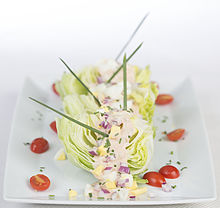Thousand Island dressing
 Thousand Island dressing on a salad | |
| Type | Salad dressing or condiment |
|---|---|
| Place of origin | Canada and the United States |
| Main ingredients | Mayonnaise, olive oil, lemon juice, paprika, Worcestershire sauce, mustard, vinegar, eggs, cream, chili sauce, tomato purée or ketchup |

Thousand Island dressing is a salad dressing and condiment based on mayonnaise and can include olive oil, lemon juice, orange juice, paprika, Worcestershire sauce, mustard, vinegar, cream, chili sauce, tomato purée, ketchup, or Tabasco sauce.[1][2]
It also typically contains finely chopped ingredients, which can include pickles, onions, bell peppers, green olives, hard-boiled egg, parsley, pimento, chives, garlic, or chopped nuts (such as walnuts or chestnuts).[3][4][5]
Origins
According to The Oxford Companion of Food and Drink, the dressing's name comes from the Thousand Islands region, located along the upper St. Lawrence River between the United States and Canada.[6] Within that region, one common version of the dressing's origins says that a fishing guide's wife, Sophia LaLonde, made the condiment as part of her husband George's shore dinner.[7] Often in this version, actress May Irwin requested the recipe after enjoying it.[8] Irwin in turn gave it to another Thousand Islands summer resident, George Boldt, who built Boldt Castle between 1900 and 1904. Boldt, as proprietor of the Waldorf-Astoria Hotel, instructed the hotel's maître d'hôtel, Oscar Tschirky, to put the dressing on the menu in 1894.[7][9] A 1959 National Geographic article states, "Thousand Island Dressing was reportedly developed by Boldt's chef."[10] Despite claims that he was involved in the introduction of the salad dressing at the Waldorf, chef Tschirky did not mention the salad dressing in his famous cookbook that was published during the time period in question.[11]
When University of Wisconsin sociologist Michael Bell and his graduate students tried to untangle the origin story for Thousand Island dressing in 2010, they found that the story differed between the various villages and islands in the Thousand Islands region.[7] They also discovered the existence of a third origin story in which the original recipe was based upon French dressing, which is supported by a recipe published in the 11th edition of the The Fannie Farmer Cookbook (1965).[7] Unfortunately, all of the claims appeared to be based upon oral traditions without a supporting written record.[7][12][13]
A few food writers also advance the claim that the dressing was invented by chef Theo Rooms of the Blackstone Hotel in Chicago during the same time period.[14][15][12] In any case, the food historians at the Food Timeline point out that the earliest print references to Thousand Island dressing do not appear until 1912 and that recipes for different versions of the dressing begin to show up shortly afterwards throughout the United States.[16]
Uses

In the 1950s, Thousand Island dressing became a standard condiment, used on sandwiches and salads alike. It is widely used in fast-food restaurants and diners in the United States of America, where it is often referred to as "Special Sauce" or "Secret Sauce". An example of this is In-N-Out Burger's "Spread", served on their burgers and several "Secret Menu" items; despite its name, it is basically a variation of Thousand Island dressing.[17] Thousand Island dressing is also often used as an ingredient in a Reuben sandwich in place of Russian dressing.[18]
See also
References
- ^ Honberger, Maud Mitchell, ed. (1914). Tried Receipts of Pasadena. p. 41. OCLC 898435934. (Note: 2 different recipes are offered in this book)
- ^ Weaver, Louise Bennett; LeCron, Helen Cowles, eds. (1917). Thousand Island Dressing. New York: Britton Publishing Company. p. 89. OCLC 657073250.
{{cite book}}:|work=ignored (help) - ^ Grimes, Etta (May 1915). "Home Economics: Some choice recipes". The Oregon Countryman. p. 325. OCLC 42327071.
- ^ Woodland, Mrs. F.B. (1919). Hurlbut, Mrs. William D. (ed.). Stevenson Memorial Cook Book. Chicago: Sarah Hackett Stevenson Memorial Lodging House Association. p. 75. OCLC 679915543. (Note: 3 different recipes are offered in this book)
- ^ Hirtzler, Victor (1919). Thousand Island dressing, for salads. Chicago: The Hotel Monthly Press, John Willy, Inc. p. 335. OCLC 682274960.
{{cite book}}:|work=ignored (help) - ^ Smith, Andrew F., ed. (2007). The Oxford Companion of Food and Drink. Oxford University Press US. p. 514. ISBN 978-0-19-530796-2. OCLC 71833329.
- ^ a b c d e Stiles, Kaelyn; Altıok, Özlem; Bell, Michael M. (28 March 2010). "The ghosts of taste: food and the cultural politics of authenticity" (PDF). Agriculture and Human Values. 28 (2): 225–236. doi:10.1007/s10460-010-9265-y. Retrieved 30 January 2015.
- ^ McNeese, Tim (2005). The St. Lawrence River. Infobase Publishing. p. 113. ISBN 978-0-7910-8245-4. OCLC 56591404.
- ^ "Thousand Island Dressing, Enjoyed around the world and... "Made in Clayton!"". Thousand Islands Inn. Archived from the original on June 27, 2007. Retrieved January 29, 2015.
{{cite web}}: Unknown parameter|deadurl=ignored (|url-status=suggested) (help) - ^ Brown, Andrew H. (March 1959). "New St. Lawrence Seaway opens the Great Lakes to the world". National Geographic Magazine. Vol. 115, no. 3. p. 336.
Today, this dressing is still being served at Oscar's in the Waldorf Astoria Hotel
- ^ Tschirky, Oscar (1896). The Cook Book by "Oscar" of the Waldorf. Chicago & New York: The Werner Company.
- ^ a b Cazentre, Don (September 3, 2011). "Three versions of the origin of Thousand Island dressing". Syracuse Post-Standard.
- ^ Smith, Susan W. (September 13, 2013). "Evidence found for the origin of the Thousand Island Dressing!". Thousand Islands Life.
- ^ Parsons, Russ (August 25, 1994). "Salad : Unfashionable Dressings: Which Thousand Islands?". Los Angeles Times.
- ^ "Iceberg Lettuce with Thousand Island Dressing". Saveur. May 7, 2007.
- ^ Olver, Lynne (January 3, 2015). "Thousand Island dressing". The Food Timeline.
- ^ J. Kenji López-Alt (July 23, 2010). "The Burger Lab: The Ins-n-Outs of an In-N-Out Double-Double, Animal-Style". Serious Eats. Retrieved March 29, 2015.
- ^ DiSpirito, Rocco (2010). Now Eat This! 150 of America's Favorite Comfort Foods, All Under 350 Calories. Random House. p. 75. ISBN 978-0-345-52090-6. OCLC 851387051.

